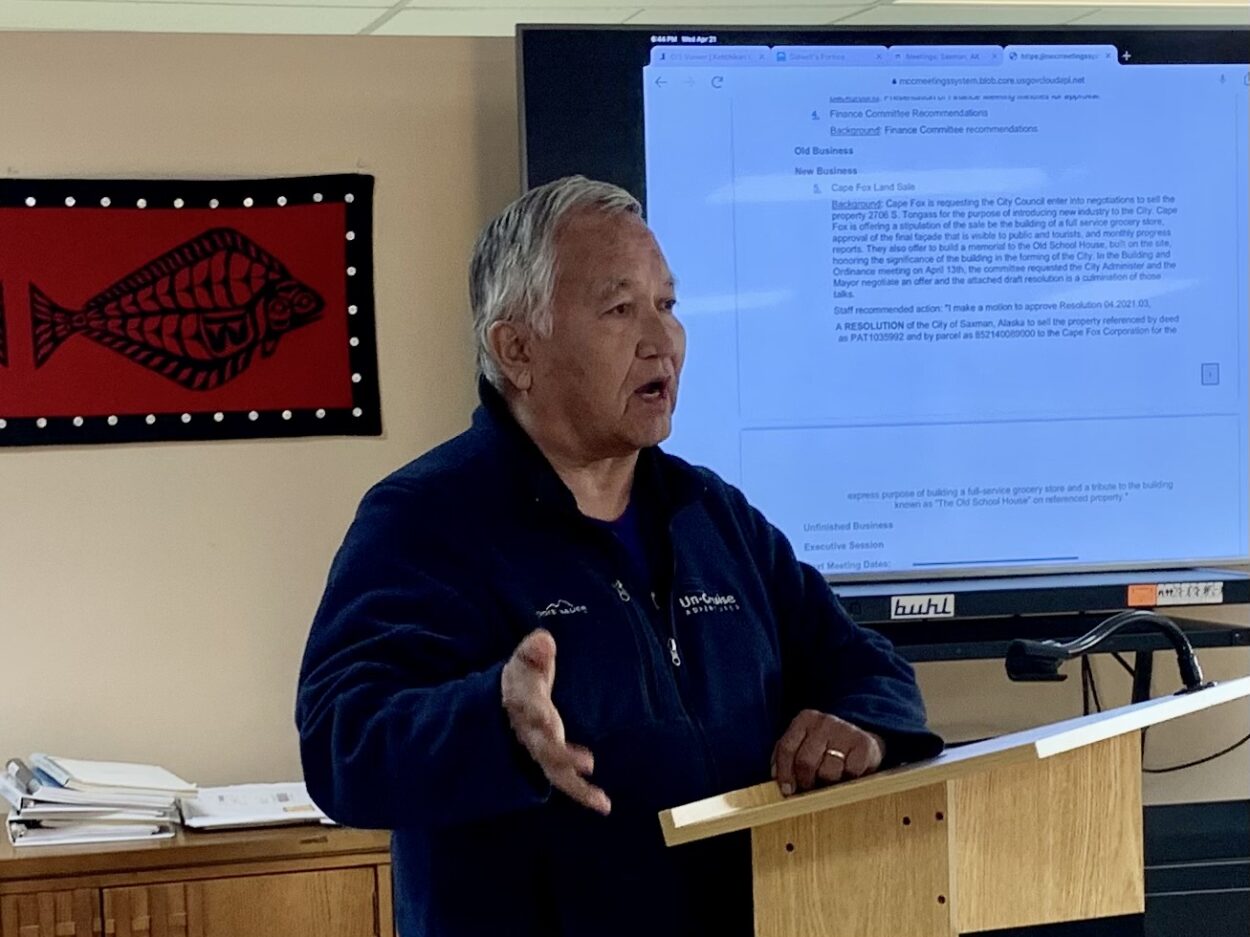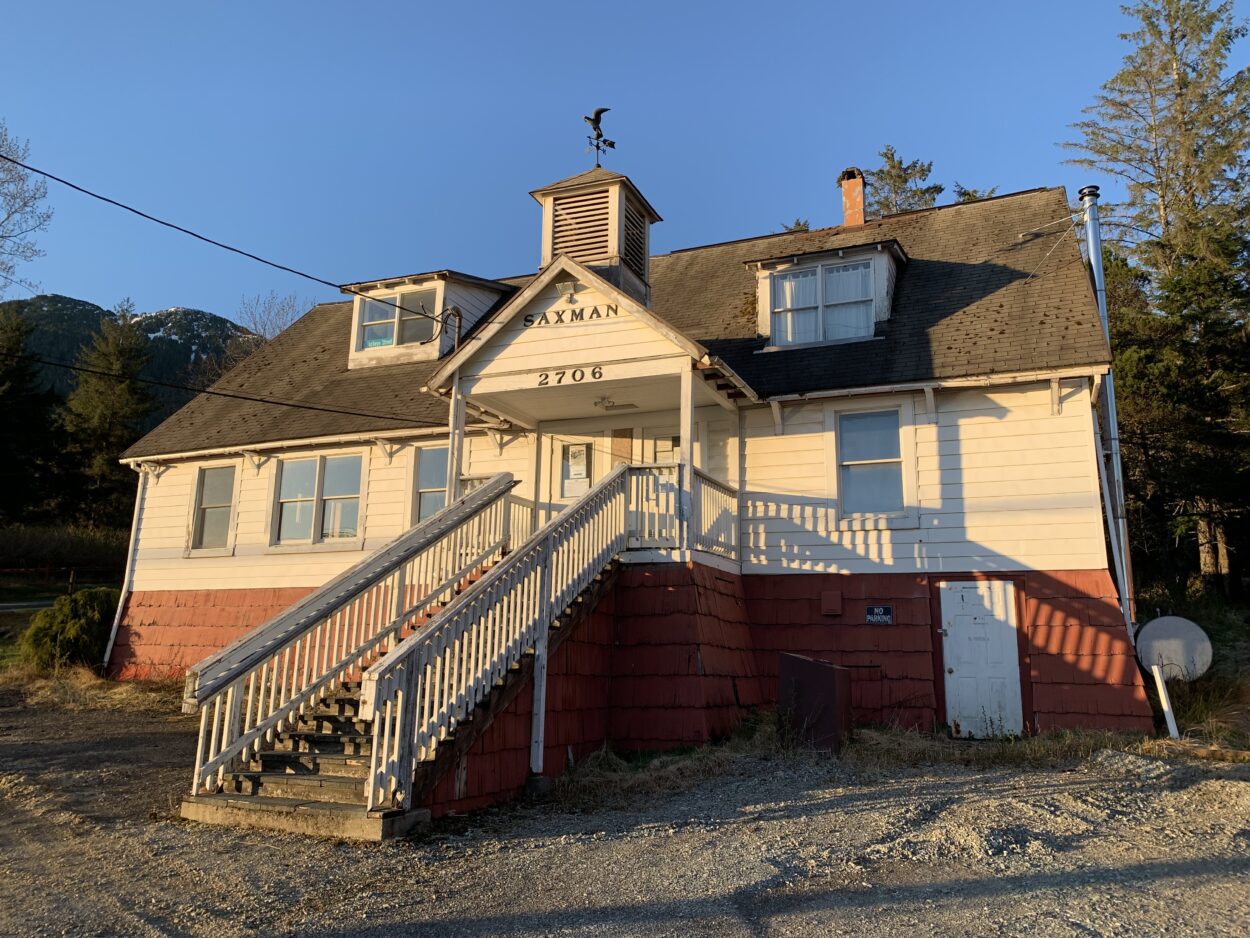A controversial plan to bulldoze or relocate Saxman’s historic schoolhouse and replace it with a grocery store is on hold after the village’s Native corporation announced Friday it’s stepping away from the project.
Saxman’s Cape Fox Corporation had proposed building a grocery store on the site of the 19th-century schoolhouse roughly three miles south of Ketchikan. The community’s tribal council has its offices inside. And it’s thought to be the oldest inhabited building in the community of about 400 people.
Saxman City Councilor Gabe Daniels told KRBD Friday that she thought a grocery store at the corner of South Tongass Highway and Totem Row could be a village hub.
“It might be good to have all of our people down there working, and we could go in there and see them. It might be a new spot to gather, it might be our new heart,” Daniels said.
Saxman’s City Council unanimously voted Wednesday to start the process of selling the property to Cape Fox for at least $45,000. That’s a fraction of its assessed value of about $618,000 as it appears on the borough’s tax rolls, though city officials say they think the lot is overvalued. The terms also included a sales tax break for its first 15 years of business. Mayor Frank Seludo defended the terms in a prepared statement he read on Friday.
“There’s much more value in this site and in the conversation than the purchase price. Cape Fox Corporation is not generally in the business of grocery stores. Playing hardball in the current economic environment means being creative and using resources other than dollar bills to get and keep the city not just surviving, but thriving,” Seludo said.
But now, the developer is pressing pause. The head of Cape Fox’s commercial division, Tim Lewis, read a statement to KRBD on Friday.
“At this point in time, due to concerns from the community, we are putting things on hold while we look for other opportunities,” Lewis said.
Those concerns were heard at last Wednesday’s Saxman City Council meeting. Sharon Seierup was among the dozen or so to speak up. She said she saw Saxman’s former schoolhouse as one of a precious few remaining connections to past generations and implored the council to retain the land and leave the structure standing.
“We have just a few things left out here,” she said. “It’s important to keep your identity.”
But people speaking out were split. Others, like a former Saxman mayor pointed to the dire financial situation of the city.

Former Saxman mayor Joe Kaakishké Williams, Jr., speaks to Saxman’s City Council on Wednesday. (Eric Stone/KRBD)
“My name is Joe Williams; my real name is Kaakishké,” he said.
He said Saxman is struggling from the lack of tourism in the region. The city recently laid off its sole public works employee.
“I struggle with the change, but I also struggle with the lack of money in our community,” he said.
Some, like Kenneth “Kelly” White, said they saw the school — where white missionaries forced the Sanyaa Kwaan and Taant’a Kwaan Tlingit inhabitants to change their names and barred them from speaking their own language — as a symbol of oppression.
“How I see it, that building, to me, is kind of the equivalent of the Confederate flag,” he said.
After meeting with Cape Fox representatives for more than an hour behind closed doors, Saxman’s City Council emerged and voted to enter negotiations to sell the property.
Details of the scale of the proposed business haven’t been publicly released.
Three of the seven council members — including the mayor — work for companies owned by Cape Fox Corporation. None recused themselves during negotiations or the vote. The city says its attorney had cleared them from a potential conflict of interest because they work for subsidiaries and don’t report directly to Cape Fox’s corporate office.
Councilor Gabe Daniels told KRBD on Friday that in a small place like Saxman, apparent conflicts of interest are tough to avoid.
“So I agree that it can look like that, but there’s only so many people in our village that want to work,” Daniels said.
What comes next is unclear. Cape Fox’s Tim Lewis says that the village corporation is always looking for new ways to invest in its community.






